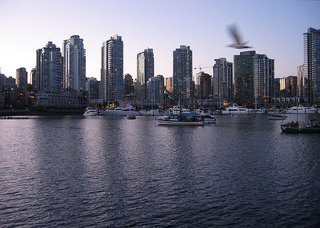Hot BC Housing Market Really a Bubble?
 Vancouver, arguably the nation's hottest real estate market with year-over-year double-digit pricing increases and average homes selling for half a million dollars, economists are fearing that there are indications of a real estate bubble that is close to bursting.
Vancouver, arguably the nation's hottest real estate market with year-over-year double-digit pricing increases and average homes selling for half a million dollars, economists are fearing that there are indications of a real estate bubble that is close to bursting."That's an eyebrow-raising price increase, but I would prefer to wait and see if it is an anomaly," said University of British Columbia real estate economist Tsur Somerville of a 22 per cent jump in housing prices over the same time last year. "I for one would be concerned if prices in the second quarter showed an equally large increase."
Craig Alexander, deputy chief economist at TD Bank Financial Group, said that booming economic conditions offer the perfect breeding ground for speculative price bubbles to form.
"That's because in such an environment, housing market participants are at greater risk of developing a case of irrational exuberance, especially if they expect that such exorbitant price gains will continue indefinitely."
He said the risks appear to be greatest in Vancouver, where on Thursday, telephone lines opened to give residents a chance to register as a potential buyer in the city's most highly anticipated condominium sale: 'Woodward's District,' a 536-unit development smack in the middle of Vancouver's notorious Downtown Eastside, otherwise known as Canada's "poorest postal code," thanks to the throngs of prostitutes, drug addicts and petty thieves that line the streets and alleys near the building's proposed site.
The actual sale for a Woodward's property starts Apr. 22, with prices ranging from $200,000 to $800,000, but only those who register starting Thursday will receive a wristband that allows them to participate in the sale. The completion date for the project is slated sometime in 2009.
But while some experts continued to warn the pace can't continue, others said there's no need to worry just yet.
"With today's data, it goes without saying that there is still not a shred of evidence that Canada's housing market is tapering off," said Marc Levesque, chief fixed-income strategist at TD Securities. "Construction activity is proceeding at a red-hot clip, resale activity remains solid, and building permits are not even hinting at a slowdown."
And that could increase pressure on the Bank of Canada to continue to nudge up its trend-setting short-term interest rate. The central bank has already boosted rates five times since last fall as a pre-emptive strike against inflation.
At the time of its last increase in early March, when central bankers raised their overnight rate to 3.75 per cent, they indicated they were almost finished tightening.
However, strong economic data -- including a record low jobless rate of 6.3 per cent in March, the lowest in 32 years -- is raising speculation that the Bank of Canada may have to raise rates a few more times to keep the economy from overheating.
Its next scheduled chance to change interest rates comes on April 25.
The CMHC report wasn't completely good news, carrying the seeds of a possible slowdown in the months ahead, with construction of apartments and condos outpacing that of single-family homes in March, which hints at some weakening to come, warned CMHC's chief economist Bob Dugan.
Toronto and Montreal in particular saw apartment starts surge last month, he said.
At the same time, "single starts decreased for a second consecutive month, suggesting that the pace of new-home starts will begin to pull back."
On a seasonally adjusted basis, urban starts rose 4.7 per cent to 219,700 units in March.
Multiple starts, or new construction of apartment and condominium buildings, rose 18.6 per cent to 123,000 units between February and March, while construction of stand-alone houses fell 8.9 per cent to 96,700 units.
Residential construction got a lift in the first quarter from unusually warm weather, adding fuel to the Canadian economy, said Scotia Economics analysts Sarah Hughes.
That could "diminish somewhat in the second quarter as declining affordability, rising construction costs and a cooling resale market tempers housing demand," she wrote in a note to investors Monday.
But other factors will continue to prop up the market, Hughes added.
"While starts are expected to trend downward in 2006, Canada's generational-low unemployment rate and respectable wage gains should continue to support a historically high level of residential construction."
For the first three months of the year, actual urban starts were up 19.1 per cent from the first quarter of 2005, with all regions of the country gaining on last year.
Single-home starts were up 16.7 per cent, while multiples were up 21.1 per cent.
In March, a jump in apartment construction in Montreal meant the Quebec region led Canada with a 21.2 per cent increase in urban housing starts, to 48,100 units.
Urban starts declined in the Atlantic region and Ontario, and were virtually unchanged in British Columbia.
GlobalNational


2 Comments:
I think that the vancouver housing market has got to be nearly ready to pop. New home buyers would have to be crazy to en
ter into a market like this, and
transitional moves can only keep it going so long. Everyone I know is trying to cash in--a friend even took out a second mortgage to buy a property to flip in a few months. Crazy!!!!
The vancouver market is insane. Houses in abbotsford that were going for 340 000 two years ago are now being sold at 500 000. A neighbour put their house up for 470 000 couldn't sell it, took it off the market and raised it 10 000 and it sold within two days. People are panacing! Everyone thinks they've made so much money on there house, put it up--but what are they thinking, they have to buy on the same market!!!!
Post a Comment
<< Home